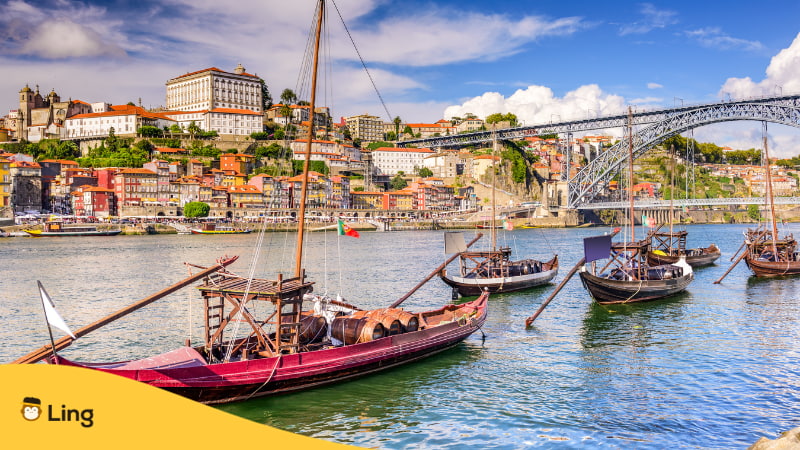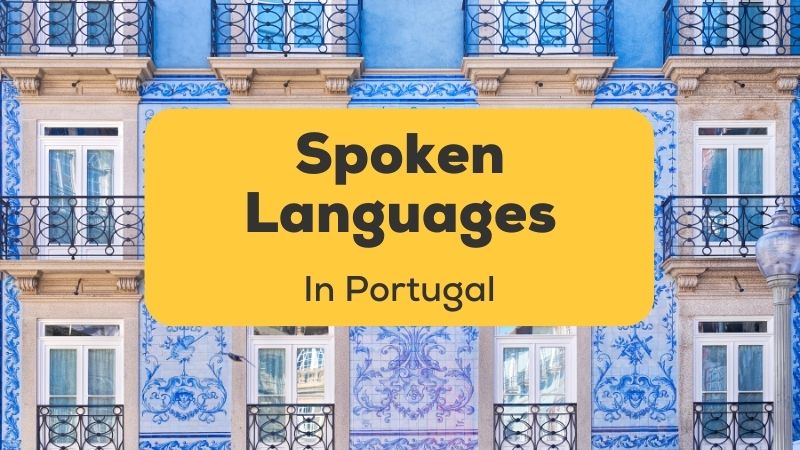Are you traveling and want to know the spoken languages in Portugal? Don’t worry anymore! In this article, I will walk you through all the information to help you connect with the locals and experience this incredible culture to the fullest!
More importantly, you’ll get to learn new information related to the Portuguese language. Let’s get started!
Quick Facts About Portugal
Before we figure out what are the spoken languages in Portugal, let’s learn more about the country. Portugal is a small country in the Westernmost part of Europe, tucked between Spain and the Atlantic Ocean. Country of Pastel de Nata, Cristiano Ronaldo, and 1001 ways to cook cod fish, Portugal is a modest country with a population of around 10.3 million people. Despite being a relatively small country, don’t you think for a minute that it isn’t filled with culture and tradition? Its capital Lisbon is filled with a rich tradition resulting from a complex mix of many civilizations during the past millennia.
As traditional Portugal saying tells Quem vê caras não vê corações (Who sees faces doesn’t see hearts), meaning that you should see just someone by their faces but look into their hearts. Do not judge Portugal for its size; it is a huge country if you count culture and tradition. Let’s get to know more about this country below!

Why Is Portugal Important?
For thousands of years, Portuguese people were the conquerors of the world. Through a time that was described as Descobrimentos (Discovery), Portugal reached the four corners of the world and spread the Portuguese language all across the globe. It all started in 1415 when Portugal conquered Ceuta, and from then came Angola, Cabo Verde, Mozambique, Brazil, India, and Malaysia, among many others! In all these countries, people speak Portuguese. However, there are some differences, like accents and specific slang words.
This exploration of the globe led to the Portuguese official language being spread throughout the globe. With time, new variations were created, such as Portuguese from Brazil or Portuguese from Angola. Despite being based in Portuguese, some words and expressions are only used locally. During this time, Portuguese speakers were growing by the minute!
Due to the former African and South American colonies, about 7% of the Portuguese population are immigrants from Brazil, Cape Verde, Angola, and Guinea-Bissau, among others. The great majority of the Portuguese population is Catholic, with Protestants, Mormons, Muslims, and Hindus being part of the minorities.

What Is The Native Language Of Portugal?
Portuguese is the official language of Portugal. This western Romance language is part of the Indo-European language family, originating in the Iberian Peninsula of Europe. Despite being a small country, from North to South, different dialects and accents exist in the Portuguese language. There are five different accents across Portugal:
- Northern accent – Spoken around Porto and the Northern part of the country
- Central accent – Mainly spoken in Lisbon and the central area
- Alentejano – Spoken in the Alentejo and Southern area of Portugal
- Madeirense – Spoken in the Madeira archipelago
- Açoreano – Spoken in the Azores archipelago
Portuguese is commonly known as Língua de Camões, or Camões’s language, in honor of the biggest poet in Portugal’s history, Luís de Camões, author of the Os Lusíadas.
Across the globe, around 240 million people have Portuguese as a native language, while 24 million have it as one more language spoken besides their native language. Interestingly, it is listed as the sixth most spoken language in the world, but it is also one of the hardest languages to learn.
Besides Portuguese, the other language spoken in Portugal by a fraction of the population is Mirandese – a language that is sparsely spoken in a small area in the northern part of Portugal – however, this language has been declining in terms of the number of speakers and is completely negligible compared to Portuguese. Although spoken in Portugal, this language is not the country’s official language.
Foreign Spoken Languages In Portugal
Besides Portuguese, there are other commonly spoken languages in Portugal. These languages are the most popular languages spoken. However, they are not universal among Portuguese speakers.
Spanish
Being a neighboring country with a very similar language to Portuguese, Spanish is a very common language to be spoken in Portugal. About 10% of the population is either fluent or can converse in Spanish. Besides being taught in school for a couple of years, many Portuguese have vacations and travel around Spain, where they pick up some vocabulary and learn a bit of Spanish. Additionally, a very strong Spanish TV and movie culture in Portugal also helps this language spread throughout the country.
English
This is the second language most spoken in Portugal. English is taught in school from early on until high school, where students learn it until they leave for college. Almost every Portuguese person has basic English knowledge, so it will be very easy to communicate and understand in Portugal if you dominate this language.
Furthermore, in the later years, a big community of English-speaking people (from the UK, America, Canada, and Australia) has been forming in the Southernmost part of Portugal, called the Algarve. Mostly retired, this population has been heading to this part of Portugal because of the good weather, incredible beaches, fantastic food, and meager living costs compared to their home country.
Conversely, for English speakers, Portuguese is a reasonably easy language to learn, especially European Portuguese. There are some similar words, although Portuguese grammar may be a tough challenge for English speakers.
French
The French language is also a Romance language widely spoken in Portugal. It was introduced in Portugal in the 19th century and was popular until the 1970s. Although the use of French has been declining over the years, about 10% of the population is fluent in this language.

Wrapping Up
Portugal is very multicultural, where several foreign languages are spoken and becoming more widespread across the country. Portuguese is the official language spoken by the vast majority of people and is the language you should explore and learn if you want to visit or even relocate to Portugal. Although grammatically complex, this language is straightforward to learn once you get the hang of the sentence structure. There are many spoken languages in Portugal that are similar to Portuguese, so you may want to learn some of them simultaneously. So how do you do that? With a language learning app, of course!
Come Learn Portuguese With Ling
Now that you’re aware of the spoken languages in Portugal, you may want to learn more about those other amazing languages. Are you coming to Portugal, and you want to connect with locals and ensure that you can communicate and be understood? Then your best chance of doing that is to learn the official language, Portuguese. Despite most people speaking English, you’re almost certain to deal with someone who doesn’t say a word of it, and in that case, you’ll want to get some Portuguese words in your vocabulary set!
That is why I have the perfect tool for you to learn Portuguese! It is called the Ling app and will be your best friend during this language-learning journey! It is a language learning platform with vocabulary and grammar lessons that will help you master any language you desire to learn, including Portuguese!
Our lessons are fun, interactive, and relevant and were proofread by native speakers so that we can deliver to you the most accurate information. What’s even more interesting is that it is accessible anywhere and every time, so you can learn at your own pace!
So don’t waste more time. Download the app on the Play Store and App Store right now and become a Portuguese speaker in a heartbeat!



































































